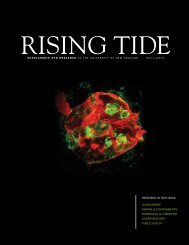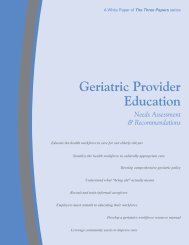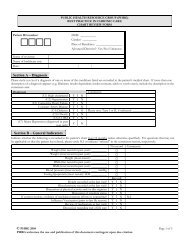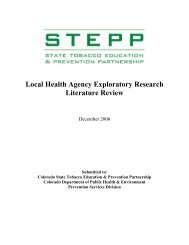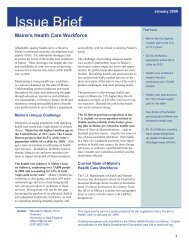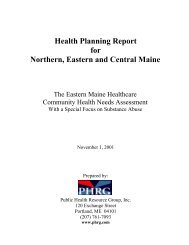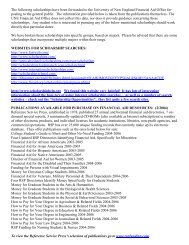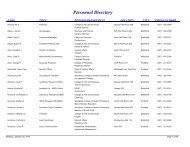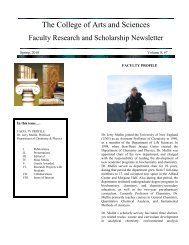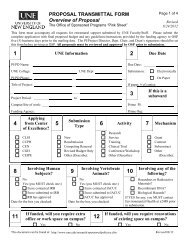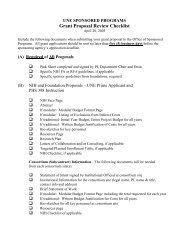Marine Animal Rehabilitation Center - University of New England
Marine Animal Rehabilitation Center - University of New England
Marine Animal Rehabilitation Center - University of New England
You also want an ePaper? Increase the reach of your titles
YUMPU automatically turns print PDFs into web optimized ePapers that Google loves.
<strong>Marine</strong> <strong>Animal</strong> Facts<br />
o<br />
o<br />
o<br />
Kemp’s Ridley<br />
(Lepidochelys kempii) sea<br />
turtles are the smallest <strong>of</strong><br />
the seven species <strong>of</strong> sea<br />
turtles. The ONLY place<br />
that they lay their eggs is<br />
Rancho Nuevo, Mexico<br />
from April to June.<br />
Harp Seal (Phoca<br />
groenlandica) pups’ white<br />
lanugo coat is not white, it<br />
is actually transparent. The<br />
coat not only acts as<br />
camouflage on the ice and<br />
snow, but helps to reflect<br />
the sunlight to keep the<br />
animal warm.<br />
Cetaceans (whales,<br />
dolphins and porpoises)<br />
“sleep” by resting one half<br />
<strong>of</strong> their brain at a time.<br />
While one half <strong>of</strong> the brain<br />
stays awake to make sure<br />
the animal breathes and<br />
alerts them <strong>of</strong> any danger<br />
in its environment, the other<br />
half <strong>of</strong> the brain rests.<br />
Stef, the Harp Seal Pup; A Rare Sight in <strong>New</strong> <strong>England</strong><br />
By: Alyssa Barton<br />
The little white ball <strong>of</strong> fur that sent the <strong>University</strong> <strong>of</strong> <strong>New</strong> <strong>England</strong> campus into a<br />
frenzy in February has been a wild ride. The vocalizations heard across campus<br />
were from Stef, the harp seal pup that was abandoned at birth in Sprucehead,<br />
Maine. She was admitted into the <strong>Marine</strong> <strong>Animal</strong> <strong>Rehabilitation</strong> <strong>Center</strong> on February<br />
24 th 2011, when she was just a day old.<br />
Stef’s arrival at MARC took many people by surprise, harp seals are typically<br />
born in Canada so not only is it incredibly uncommon to find harp seals this far<br />
south but she is also the first harp seal pup to be treated at MARC.<br />
At MARC it is a daily task to provide the seals with food, exercise (swim time),<br />
vitamins, medications when needed and sometimes other special treatments for the<br />
staff to ensure that the animals are eating enough to maintain a healthy weight and<br />
strength. Since the harp seal pup is so unique, some routine tasks required<br />
amending. The staff and volunteers would never think to have backed down from<br />
the challenge! Stef’s presence inspired the use <strong>of</strong> feeding and treatment, methods<br />
not typically used at MARC, such as a new milk formula recipe and different feeding<br />
mechanisms.<br />
After spending the past few weeks in the center, the pup has made very good<br />
progress; she was given antibiotics to prevent a possible infection <strong>of</strong> her open,<br />
healing umbilical and medicine for stomach issues. Overall she is healthy and has<br />
a very playful personality. Her weight has increased; when she was on formula,<br />
she was consuming up to 4 liters per day; from which she gained 3 pounds a day.<br />
She has now switched over to consuming 6 kilograms (13.2 pounds) <strong>of</strong> fish a day;<br />
her favorite is capelin. She has even shed her lanugo! This thick white fur that<br />
covers the pups’ bodies after birth usually begins to shed around the first few weeks<br />
<strong>of</strong> life.<br />
o<br />
Hooded Seals (Cystophora<br />
cristata), have the shortest<br />
nursing period <strong>of</strong> all marine<br />
mammals. 3 to 4 days <strong>of</strong><br />
milk from Mom, and baby is<br />
left to start hunting fish on<br />
their own.<br />
The pup has been able to maintain some <strong>of</strong> her wild instincts and biological<br />
elements; as she was weaned <strong>of</strong>f <strong>of</strong> formula she refused to eat fish and<br />
experienced a decrease in weight but soon learned how to associate swimming<br />
with food. This routine is natural in the wild; when mothers are done nursing the<br />
pups, they go <strong>of</strong>f to find a new mate and leave the pups alone on the ice. The<br />
young stay on the ice sheet, without food, until it melts out from underneath them<br />
and they fall into the water where the instinct kicks in to begin catching fish. Stef<br />
loves to swim, on her back, and catch the live fish in her pool.<br />
Conservation Corner<br />
o<br />
Almost 90% <strong>of</strong> floating<br />
marine debris is plastic.<br />
Due to its durability,<br />
buoyancy, and ability to<br />
accumulate and<br />
concentrate toxins present<br />
in the ocean, plastic is<br />
especially harmful to all<br />
marine life. Please dispose<br />
<strong>of</strong> your plastic properly and<br />
recycle!<br />
Photo: Kylie Galliani<br />
With harbor seal pups, they are usually released once they weigh 50 – 60 pounds,<br />
and are in good health. Stef is well on her way to release!



